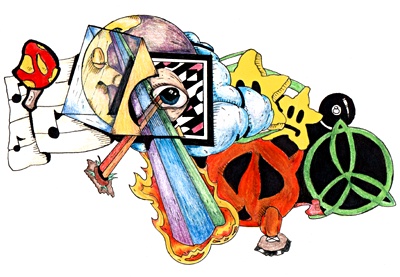All Nonfiction
- Bullying
- Books
- Academic
- Author Interviews
- Celebrity interviews
- College Articles
- College Essays
- Educator of the Year
- Heroes
- Interviews
- Memoir
- Personal Experience
- Sports
- Travel & Culture
All Opinions
- Bullying
- Current Events / Politics
- Discrimination
- Drugs / Alcohol / Smoking
- Entertainment / Celebrities
- Environment
- Love / Relationships
- Movies / Music / TV
- Pop Culture / Trends
- School / College
- Social Issues / Civics
- Spirituality / Religion
- Sports / Hobbies
All Hot Topics
- Bullying
- Community Service
- Environment
- Health
- Letters to the Editor
- Pride & Prejudice
- What Matters
- Back
Summer Guide
- Program Links
- Program Reviews
- Back
College Guide
- College Links
- College Reviews
- College Essays
- College Articles
- Back
Television: Your Family?
"Will you turn the parlor (TV) off?" asks Montag to his wife, Mildred. The TV blares from the parlor, echoing to Montag's room. Mildred just stands there in the doorway, hollow eyes blinking slowly. "That's my family," she replies.
Although these characters - taken from Ray Bradbury's classic novel, Fahrenheit 451 - may be from a science fiction novel, many readers know that formally "absurd" ideas written in novels decades ago have today become horrifying realities.
Such as television.
The beginnings of television go back to the 50s, when television was much more... innocent. Bruce Fetts of ew.com writes that in 1968, "Sponsors and viewers object to a sequence in Petula Clark's NBC special in which the British singer touches guest Harry Belafonte's arm." But turning on the Tube today, one is hard pressed to find a timeslot that never shows a woman seducing a man while scantily clad, a man drinking alcohol with another man, or a brutally realistic fight. And while our definition of "controversial" has stretched, so has our addiction to the Tube.
Robert Kubey of Scientific American magazine writes that researchers, while studying viewer's responses to TV, have found that people, while watching TV, feel relaxed and passive, with less mental stimulation than those who read. But even after the TV is turned off, the sense of "relaxation" continues, along with the feelings of passivity and lowered alertness. It was as if "television has somehow absorbed or sucked out their energy, leaving them depleted" (Kubey).
Television viewing has unknowingly crept into our homes, and many families have a nightly ritual of turning on the Tube before bedtime. This has become our ritual - viewing people we don’t know, never will know, and have no reason to know. This is how 60% of us teenagers spend 20 hours of our week, according to a study presented at the American Heart Association's 48th Annual Conference on Cardiovascular Disease Epidemiology and Prevention. Yep, that's how our addiction to TV has become. It is now mentioned at a conference for diseases.
Would you consider your TV viewing a disease? No, right? Your favorite show is about to come on soon anyway, am I correct? As Maria Schneider, editor of Writer's Digest, says, "Seeing favorite shows - The Office, 30 Rock, My Name is Earl - on the air again was like getting back in touch with your hilarious, best group of pals that you haven't touched base with for a while."
Am I the only one who thinks there's something seriously wrong with that statement?
The television holds no friends. They are actors, here to entertain you. Although this bridge was first established and well-respected in the early years of television, it has long since been burned down, making way for a new, high-definition, Sony Plasma screen beauty fueled with reality television that, as we all know, is no reality.
One must remember that these people are actors. Their job is to entertain you. But they are not your friends - they're real people underneath masks, like at a masquerade ball. It's fine to view TV with a certain caution, a certain knowing that these people you see on the screen before you are not real (and never will be). You just can't let yourself fall with all the other viewers, believing that the TV is your only source of relaxation. Read a book. Take a walk. Write a story. Play a sport. Just think twice next time before you turn on the Tube.
You have friends beyond the TV. There are other people who want to talk to you. Trust me.
Still disagree with me? Then go on.
Turn on your show - oh wait, no. Turn on your family.

Similar Articles
JOIN THE DISCUSSION
This article has 7 comments.
